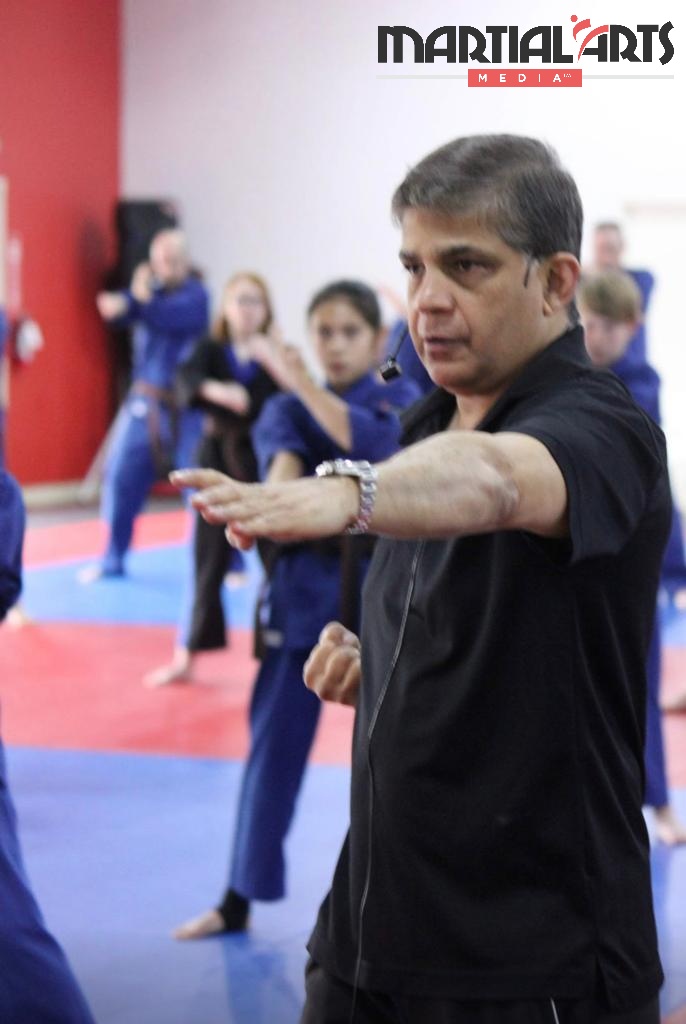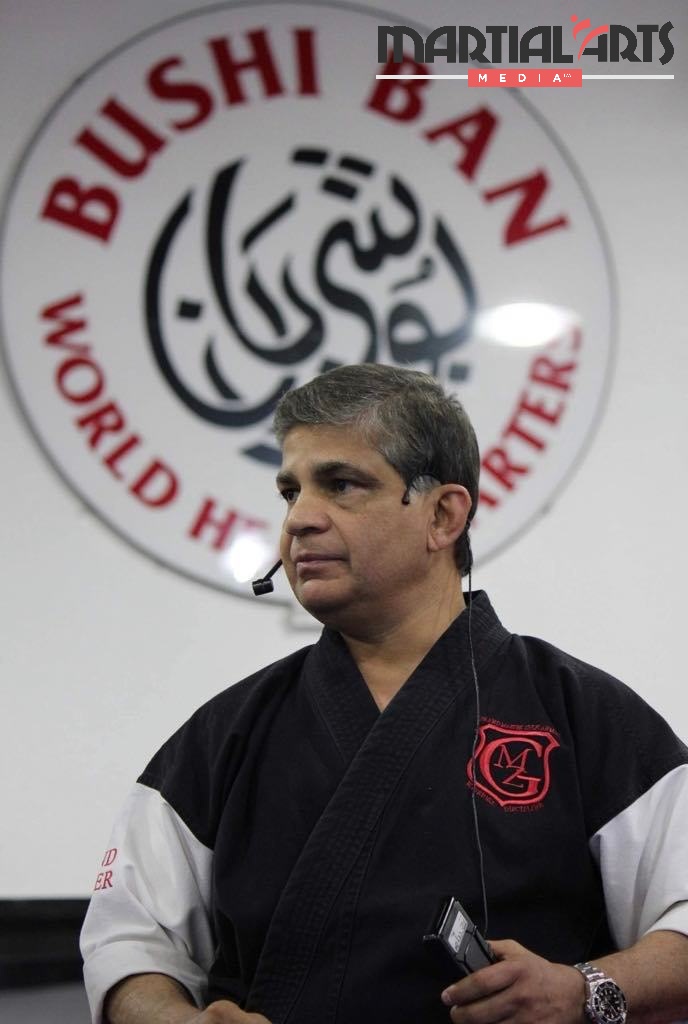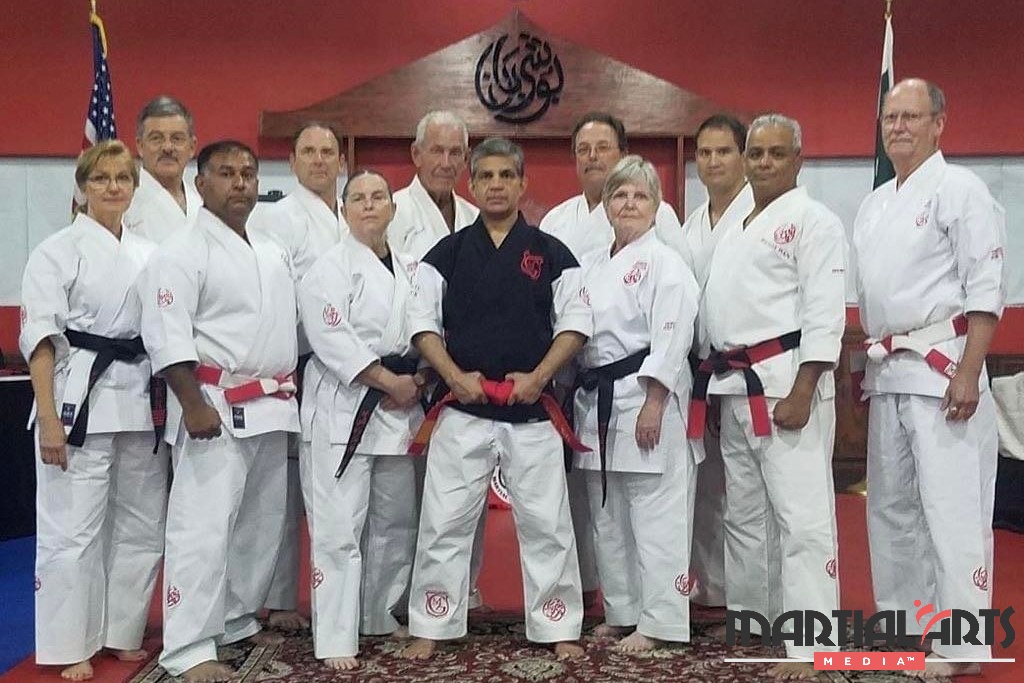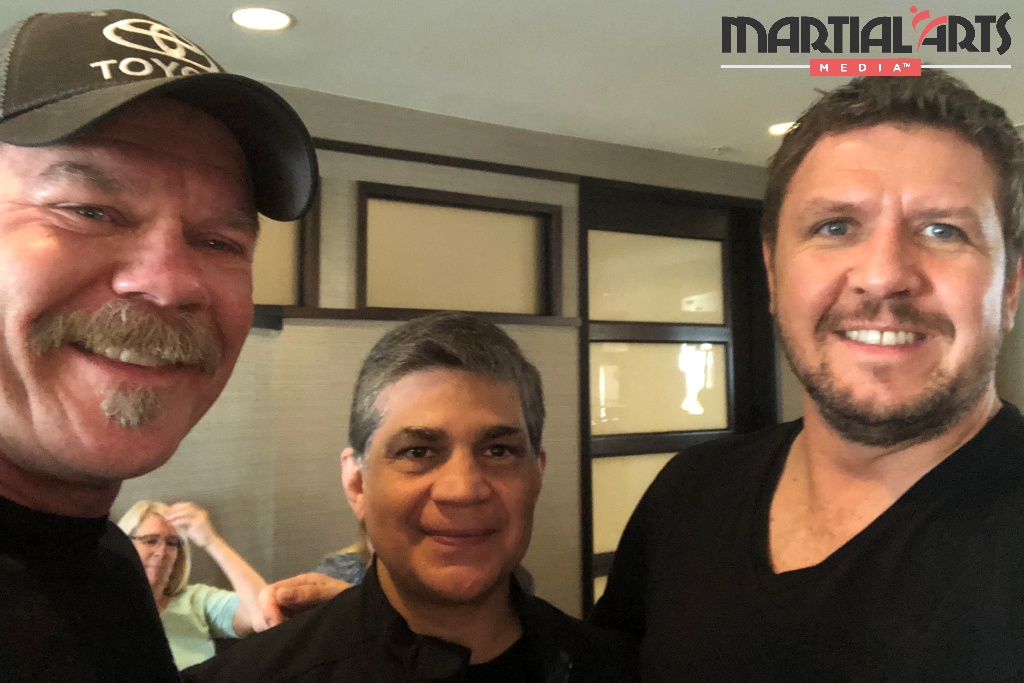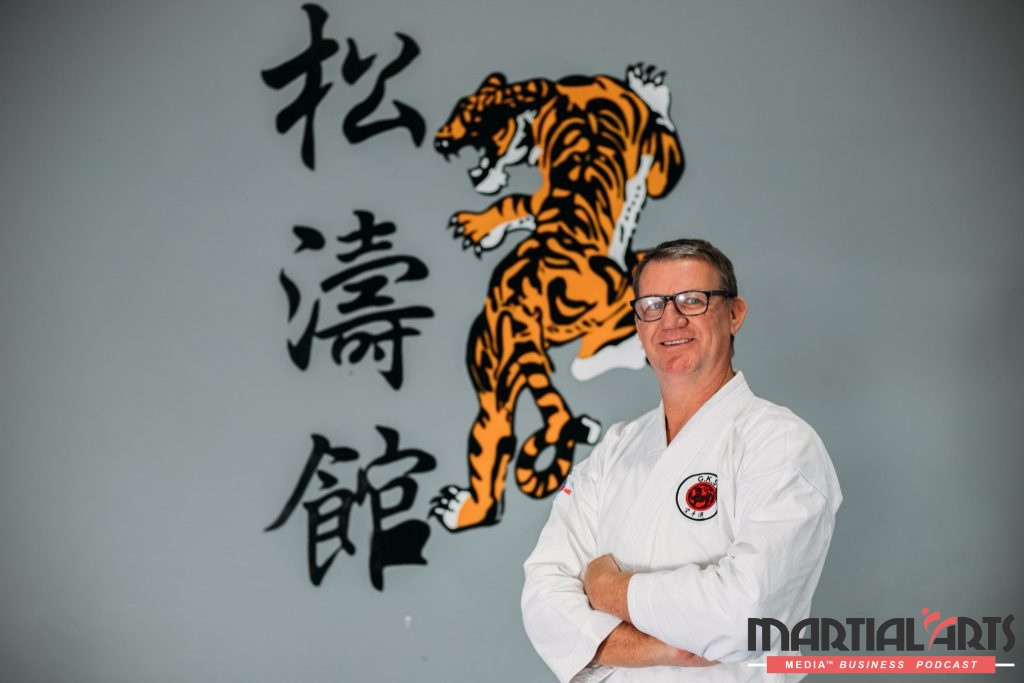IN THIS EPISODE:
- Creating a 100-day onboarding funnel to boost martial arts student retention
- Master Zufli’s advice to martial arts school owners with over 100 students and pushing to 200
- A powerful concept that can help increase martial arts lead conversions rate by 70% to 90%
- Masterminding with your staff to create an amazing system for martial arts school success
- How to set up an encouraging martial arts career path for your students
- And more
*Need help growing your martial arts school? Start Here.
TRANSCRIPTION
I'm going to share with you a very powerful concept, only in the meeting, that will increase your lead to conversion, by up to 70% to 90%.
GEORGE: Master Zulfi, welcome back once again, back-to-back weeks to the Martial Arts Media™ Business Podcast.
ZULFI: My pleasure. It's my pleasure.
GEORGE: Today I want to do, I guess just extend last week's Episode 142. We spoke about how to elevate your martial arts business to the next level. It was a bit of a teaser in the subject line, with Master Zulfi's Breakthrough Mindset Formula, and we didn't go that deep into it.
So what I wanted to do today, was chat a bit about what that is, in a bit more detail, but also for anyone that's coming to The Partners Intensive on the Sunshine Coast in Australia, which will be the 2nd to the 4th of June.
Master Zulfi is joining us all the way from Houston, Texas, about as far as you can travel, and he'll be spending the entire day today, going through a bunch of things that I want to learn about today, as well.
I know it's going to be great. It's the challenge of, how we condense 50 years of knowledge into one day of impact, and that it's impactful for you as the school owner. So glad to have you back on.
ZULFI: Thank you very much. It's my pleasure. And again, I'm super excited. Finally, get to go to Australia, meet my friends, make new friends, and share some of our successes and even failures. It's not all hunky dory, it's not all perfect.
I've experienced many failures and that itself is a part of the journey. What to do, what not to do, what to be cautious and mindful about? What to be careful of, and how to approach situations, which might be very challenging.
And George, all of us martial arts school owners, if you stay in the martial arts business for X number of years, there are certain things we are going to experience. Like in America, taxes, death, and health, it's inevitable in life. So same thing in the martial arts business timeframe, there will be challenges we know that we have experienced and we will experience.
So some of you folks out there, they might not have experienced these. So my job with my team and my group is, “Hey, be mindful, retention, instructor staff retention, instructor staff training. Sometimes deflection, people leave and go open a school down the street, some legal issues.
All things, which if you've been there for as long as I've been, you will experience, hopefully not negative, but if you are armed with the knowledge, information, and mentally aware, then you will deal with them at a much better rate.
Believe me, I've experienced a lot, good, bad, and even ugly and I've learned everything has been a lesson and everything has been a growth and it's just keeping us moving forward. So that is what I want to share.
As we were talking about, a little bit earlier, what am I going to do? So there are 2, or 3 different models where a presenter comes in and presents. So one is, with a big group, when we are in front of hundreds of people, you can go up on stage and do a PowerPoint and explain and share your information.
But with a smaller group, which I love, and I do that in the UK, Germany, Pakistan, I've got 30 to 40, 50 people that's more personalized, more intimate. And the way I like to share information and work and connect with them is number one, I will give a couple of presentations, which I feel will be very valuable and worth their time.
And then I like to open for a Q&A, we do a discussion, and we open communication, so I can understand everybody's position, phase, stage, age of business, wants, needs, fears, desires, hopes, strengths, weaknesses, challenges and we work as a team, as a think tank.
And then if somebody has a question or answer or concern or request of the set of information, whatever I can do, I will elaborate on that and then it works. It becomes a group interactive conversation with myself facilitating and leading in the area where I might be able to give more or different types of information.
So I love that and it really becomes extremely powerful and the takeaways and the breakthroughs and the moment of epiphanies become very powerful. So that's one of the models which we are going to use. Then we have that one-on-one or very small group, two people work with me. That's what I do when I go to an independent school owner.
So let's say I go to X, Y, or Z school, and in the morning or afternoon, we'll sit down for 2, 3 hours and we'll discuss. Because a lot of times there are things that you cannot or one does not like to discuss openly.
And no matter how close the group is, certain things are very private and we don't want others to know our challenges, but we don't mind sharing it one-on-one, with a person who we feel has the experience to first of all, communicate, get a second person point of view and maybe they can help you solve or resolve or overcome the challenge or the issue.
So that is very powerful on a one-on-one level. And believe me, when I go to these schools and when I do one-on-one, that powerful 2, or 3 hours is worth years of searching or trial and error or trying to figure it out themselves.
But when you have somebody who's done it, been there, seen it, and still growing, still learning, that hour or 2 hours, is worth years of searching challenges, and frustration. And when you can get that answer, that epiphany, that realization in a moment, it's well worth it.
And a lot of time people don't like to, even in small groups, unless it's one-on-one. So that's the second, third model, which I do and which I love because now I can work with you one-on-one and then we can be very open in the things we can talk about, we might not talk about them even a smaller group.
So that's another model which I will be available to do also. And then we have breakout sessions. Let's say when we do a breakout session, so we'll say we'll do a project, we might do a project, okay, let's build a funnel, just give an idea, onboarding. What are the steps that we need to do for the first 100-day onboarding, funnel, and process and nurturing? What do we need to do?
So we'll go to one group, one group, one group, two, three people in the group and we sit down and we work with the workbook or with an exercise and then we'll all come back together and say, “Okay, you give me your two points, you give me your two points, what did we come up with?” And together we all create an amazing system or process of procedure, based on solid principles and based on the input of the whole entire mastermind that we have over there.
And lo and behold, you'll see, within 45 minutes, we'll develop an amazing system, which anybody can take and incorporate. And we can help each other say, “Okay, now that didn't work. I tried it, but it didn't work, or I said this worked amazingly.” That's another format we can do. So I'll be there. I'm there for you guys.
GEORGE: I love that. It's funny you mentioned that. Yesterday in our Partners group, we did a similar thing called, the Instructor’s Roundtable. We just brought everybody in an online but roundtable setting and all instructors brought just questions, things that they struggle with, and used the power of the group to get answers and just everyone sharing the one attribute that really makes them stand out as an instructor.
But what I'm thinking we probably going to delay is, we are working on a 100-day Email Sequence for onboarding. And I think I might tell the group that we're going to wait a little bit because if we can have your hands-on input, that it'll make it so much more powerful.
ZULFI: I would be happy to. So about nine years ago, I did a 52-week and a 104-week and I was working on the third tier of student onboarding, nurturing, from prospect to a member, to a blue belt, an email sequence. And as we speak right now, I'm creating a custom funnel, software for my organization, which will have to be automated.
So we've been using Constant Contact and Mailchimp, but hopefully, by the time I get to Australia, it will be finished and integrated software system with our Bushi Ban International website, where our curriculum is parked and it's a private website for only affiliates and licensed Bushi Ban schools. And this will have an onboarding and then member, 52-week nurturing process.
And just to give you an idea, it'll have emails, it'll have doodle videos, it'll have whiteboard videos, it'll have actual videos. So we've been working on that and right now we already do, I'm going to share with you a very powerful concept, only in the meeting, that will increase your lead to conversion by 70% to 90%.
And I'll bring you examples, just from lead to conversion because a lot of people get leads but they don't know what to do once they get the lead. They might do automated email. I'm going to share with you some powerful breakthrough ideas, what to do with the lead and you will see immediately, I guarantee you, that's my guarantee, otherwise I'll buy everybody lunch. All right? That it works, it works like a charm and immediately, they'll see a response. They'll see a response, a 90% response. So we'll share that, I'll share that with you guys.
GEORGE: That's completely my language and so I'm loving that selfishly for me but obviously, for everyone that's going to be there, it's going to be awesome. I want to maybe just do an example. We were talking about the roundtable setting and working through school owners' problems.
And I'm also a big fan of this smaller type of event because this is where the transformations can happen. I feel it sometimes very impersonal, where you're at a big event and people are talking at you and the interaction feels a bit awkward and rushed.
So having that smaller type of setting, is really where you get the real breakthroughs because you get to dive deeper into what problems you're facing and what you're right about, the next thing is to take on.
So let's say, I'm going to start at the top this time and work our way down. But let's say, we took a scenario with two different school owners. Let's start with one at the top, let's say, they've got two to three locations and we're working with different situations. What is a common situation or problem that you will see faced, let's say, at about 2 to 3 locations, that you would typically work with?
ZULFI: So the first thing we do is, work on the structure of education. So I've got people who have 2, or 3 locations, how do they manage their calendar, their time, their staff training, and how do they interact with their staff with each location? What are the processes, procedures, events, training, and methodologies they have and how do they incorporate? I'm going to share my 10 points.
So every quarter we have our big staff meeting. So on May 17th, which is Wednesday, we will have about 40 to 50 people here at the headquarters and we start at 9:00 AM and we go through our staff training and these are not directors, these are instructors, managers, program directors, they'll all come together and we are going to share with them their duties and how can they be the key significant operator to help the business grow?
We give out actual tasks and responsibilities, how can they provide and produce for the business? So we have a clear outline and we share that with you and I'll give you that presentation that day. Please remind me, I'll give you 10 points, but when you have your key staff meeting, what is the mindset you want them to have?
Because they're all well-wishers, if they're working in your business, they want to be there. All right, so first we need to understand, they are not there to harm you, they're there to help you. But as a school owner, and as a business owner, what can we help them with so they know clearly, defined actions, methodologies, and systems that they can incorporate the next day and start making money and growing their business?
So I'll share those 10 points with you, so you can go and start teaching and I'll share how we do the staff meeting.
This is a big staff meeting, 40 to 50 people come in, different schools and we do the training staff and instructors, directors training, then we have lunch, we have some awards and prizes.
So I'll share that with you. So this will help the multi-school or even single-school owner, how to motivate, inspire, educate, and allocate tasks for each school or each staff member, so they can become a much more valuable component of your business success. They need to know, above and beyond their regular job description, what else can they do.
What do they need to see and understand to help you grow? That itself is extremely powerful. Once you understand that and your staff understands that, you will see an immediate change of culture, an immediate improvement in retention and new member acquisition, and upsells immediately.
GEORGE: Very cool.
ZULFI: I hope that helps.
GEORGE: Yeah. Awesome. And so if we flip the script and say, the school owner was at just over 100 students, pushing to the next 200, what advice would you give and what obstacles are you typically dealing with, at that point?
ZULFI: So the advice is, start working on the systems now, which you will be needing six months, eight months, nine months. Understand what got you where you are, now what else do you need to add or delete from what you got to get you to the next level? Who are the key players to help you grow? Identify those players.
And what do you need to tease them, for them to help you grow to the next level? How do you help them go to the next level? That's what a staff meeting is. And what mindset and what systems you need to have or sometimes you need to eliminate.
See a lot of school owners don't realize, they might have, for example, a program or a class or a staff member, that might be hindering their forward progress. So how do you identify that and how do you either change that, or get rid of that?
So I'll give you a quick example. There are some schools, that would do the fitness kickboxing program and they've been doing it for years and years and years and they continue to truck along. I ask them, “How many people?” “I used to have 40 people, now I have about 5, 6 people.” “Well, why are you doing that?” “Well, we've been doing it for 20 years.” “Get rid of it. Well, what time is it?” “It's in prime time.” “And it's how many times a week?” “Four times a week.”
“I say, you are doing something which is no longer relevant in your business and it's no longer producing and providing you a forward, fast pace momentum, it's actually holding you back. You are availing your key time floor space, and your staff, to fulfill a dying program. If you just switch it around.”
So, a few schools did that and right away, boom, from five, they went to 25 people, just by switching that old method and realization of, “Hey, it's not working anymore or if it's working, it's not as productive as it used to be.” So being relevant, what is relevant now? What should the school do or look for and how do you tweak it, how do you change it? So sometimes, letting go is the biggest challenge.
GEORGE: Right.
ZULFI: Once we are used to something we've been doing for so many years, “No, I cannot do that.” “Well, yes you can.” You have to see the pros and cons, is this holding you back? Or maybe a staff member. That staff member no longer needs to be a staff member.
They need to either change their designation or tell them bye-bye. They're just hurting you, they're not helping you. Or a staff member that you need to utilize their maximum potential. They might be ready to be in a high-level producing leadership position and you're not giving them that opportunity or there's a program out there and you should add that program or a system, you've not done that.
Those are the things that we need to discuss and realize and find out and investigate, so we can identify and then see what we can do to implement. So those are the things that they need to be aware of.
And as a coach, a consultant, a mentor, a guide, and a facilitator, it becomes my responsibility, or anybody in my position, to find out the needs and the challenges. Not just come in, blah, what I think works for me but I need to know what needs to happen to you. See, what is working for me, might be totally alien to you.
So to grow your student, you must know your student. Don't grow them up thinking this is what is right for them but first find out. The same thing to the Mastermind, to help the Mastermind grow, I need to know the Mastermind, the key players, and what are their challenges, what are their needs, what are their desires, what are their fears, what are their weaknesses, what are their strengths. And once we can define and identify, then we can catapult the information to the next level.
GEORGE: I love it. I wanted to ask you one question before I wrap it up. And this is for my members yesterday because it's relevant to this and it's a question that came up. You've got all these locations and students that have evolved into instructors.
And I recall at the virtual intensive that you spoke at a few years ago, you spoke about creating the career path from day one, from day one, you start talking about the journey. How do you structure that? How do you create a career path for students, that they actually want to become instructors? And then how do you face the challenge that maybe they go to university and they go study and now all these other options are on the table and how do you make martial arts the priority for them?
ZULFI: That's a great question. There's no easy answer, but I'll share some of the things with you. So martial arts is a lifestyle. So Bushi Ban is a lifestyle, martial arts and that's what we start from day one. Bushi Ban, my system, is a lifestyle, martial arts. We have programs, and we have memberships, but our whole objective is to make that individual who comes in, to learn, fall in love, and pursue martial arts as a lifestyle and there are small steps we have to go through.
I'll share with you, just now, about 45 minutes ago, I had a grandfather, this is my third generation person, Mr. Vicary, he just came in, his son is my black belt but he's now 30 something years old. His grandson who's 16, he'll turn 16 soon, Caleb Garcia. So Caleb is right now is doing swimming and he has not been to class for the last nine months and grandfather wants him to be here, grandmother wants him, Mom and Dad, but he's got into water polo and swimming and he's got the varsity jacket.
So we are very proud of him and Caleb is my second-degree black belt, really good at martial arts. He started with me at four and a half years old. So he came, he had some boards, we do board breaking, Tameshiwari. So grandfather, Mr. Vicary, brought some board. He said, “They've been lying around, I just want to drop them by you.”
I said, “Hey, when am I going to see my boy Caleb?” He said, “Well, he's swimming and I want him to be there. I just bought this new Mercedes, come and take a look at it.” And I'm going and sitting in it and I told him, “Hey, I've got a three o'clock podcast, I need to talk to my friend in Australia. Hey, by the way, I'm leaving for my international trip. I'll be in Thailand and Australia.” And I shared with him, on May 21st I'll be back.
He said, he called me Zulfi, he's much older. “Zulfi, I want the same for Caleb. I've been telling him.” But I say, “Hey, he's only 15, 16 years old. He's on his path, let him do it. But he's been indoctrinated in the Bushi Ban system.” And he said, “I'm a multimillionaire.” I said, “I know you are.” He said, “I will put any money to help Caleb because I see your lifestyle.
I want this for my grandson and I will invest.” I said, “No problem, it's already in his DNA.” And he said, “I wanted this for Josh but Josh went a different route but I want this for Caleb.” And so to make a long story short, it's not to impress anybody but impress upon that, it's in the culture and lifestyle curriculum and lifestyle system, that students and their grandparents and their parents want to become part of this ongoing journey and become lifelong martial artist.
And once you identify, the school owner, that this person, it'll be good for them. So again, it's all about the student. What needs to help the student, will help you. Don't think of selfish gains, first give.
And I told him, “Caleb is extremely talented and I see him being a school owner and I will help whatever I can do, give him my brand, give him my detail, give him my systems, I'm there for you.” He said, “I want him to do it.” So because I know Caleb will be a great, great martial arts instructor, he's a great martial artist, young man, but he got a long way to go.
So is it part of your system? So for example, I'll show you. So this is a book, I've written several books, Wisdom of the Masters. So this is written by, it's part of a project for our Senior Masters, to share their wisdom with our young people. This next book is Reflection of the Grandmasters. These are life lessons that we teach our leadership team.
This is a book I wrote, I Quit, to overcome the challenges. And we give this out to a lot of our members and parents, so they understand that there'll be a time that a child might want to quit and how to overcome that. Then most of you have seen this, Signs and Secrets of Becoming a Master. So we plant the seed early. I want them to think like a master instructor early.
So what is the support material? How is it entrenched in your curriculum, lifestyle, and martial arts? How do you indoctrinate your students into thinking at one time to become instructors, first serious students, to black belts, to junior instructors, instructors, and school owners? What processes do you have, procedures do you have? What opportunities they can see and what examples are they seeing?
See, that's very important. Are they seeing examples, real-life examples of people converting from a black belt, into a master instructor, into a school owner? Are there examples that they can follow and what is their support system and how are you nurturing their mindset and the heart set and how are you showing them the benefits and the value? Not just being a black belt, but being a school owner and how sincerely and authentically, you are helping them find the path? So it is part of the culture, lifestyle, and martial arts.
GEORGE: A good note to wrap it up. Zulfi, thanks so much. I look forward to seeing you in Australia. It's going to be great. It's going to be great to hear you.
ZULFI: I'm looking forward to it. God willing, I'll be there in one piece and I can't wait. I'm excited and I appreciate it, thank you so much for your kind invitation and hospitality. I'm really honored and I'm really, really inspired and I appreciate it and I'm grateful to you for even thinking that I can come and help out and I look forward to it.
GEORGE: Of course.
ZULFI: And I can't wait. I'm excited to meet my old friends and to make new friends and to share and give whatever I can give and share, that's it, and enjoy Australia.
GEORGE: 100%, there's lots to enjoy. That's great.
ZULFI: Thank you so much.
GEORGE: Thank you Zulfi. So just a quick wrap-up. So 2 to 4, June, The Partners Intensive. It's formally a private mastermind, we offer guest tickets available. So if you would like to attend, just shoot me a message, at george@matialartsmedia.com or find me on Facebook.
Also, just want to give a shout-out to some of our members that will be talking on the first day and the last day. So Ross Cameron, Cheyne McMahon, Lindsay Guy, and also Kyl Reber will be on Sunday. So just a shout-out to our Australian members and love to hear from you. If you got any questions about the event, just reach out and Master Zulfi, have an excellent day and I'll speak to you soon.
ZULFI: Thank you. All the best.
GEORGE: Thank you.
*Need help growing your martial arts school? Apply Here.
Enjoyed the show? Get more martial arts business tips when you subscribe on iTunes, listen on Spotify, or watch and subscribe on Youtube.


